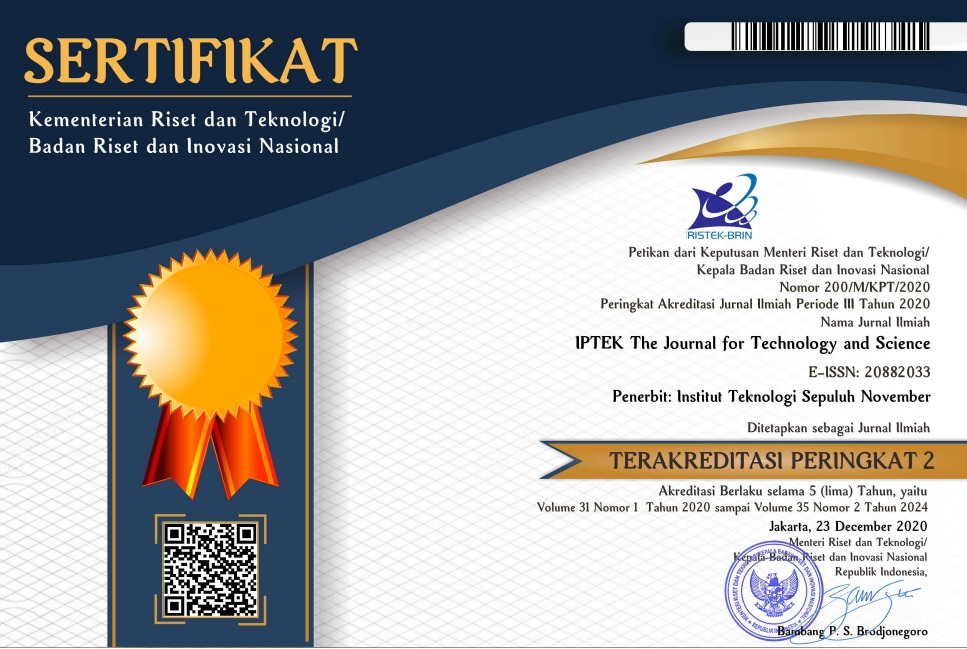The Needs for Septage Treatment Plant in The Urban Areas of Blitar Regency: A Research Study
Abstract
Keywords
Full Text:
Full TextReferences
AECOM International Development, Inc ; Department of Water dan Sanitation in Developing Countries SFIoASdTS. A Rapid Assessment of Septage Management in Asia: Policies and Practices in India, Indonesia, Malaysia, the Philippines, Sri Lanka, Thaildan, dan Vietnam. Thailand: United States Agency for International Development (USAID) Regional Development Mission for Asia (RDMA; 2010.
Hidayat H, Sasmita A, Reza M. Septage Treatment Plant Construction Design in Tampan Sub-Distric, Pekanbaru City. Jom FTEKNIK 2017;4(1):1–7.
Tayler K, Siregar R, Darmawan B, Blackett I, Gilner S. Development of Urban Septage Management Models in Indonesia. Waterlines 2013;32(3):221—-236.
Meidiana C. Development of Waste Management Practices in Indonesia. European Journal of Scientific Research 2010;40(2):199–210.
Irawan A, Santoso EB. Analytical Tools Beyond Gini Index to Study Inequality: a Case of City of Blitar, East Java, Indonesia. (IOP) Conference Series: Earth and Environmental Science 2019;340:012004.
Kusuma S, Aulia B, Farikha N. Problem Identification of Micro Hydro Power Plant Program in East Java Province. (IOP) Conference Series: Earth and Environmental Science 2019;340.
Hansen DR, Moen MM. Management Accounting. 6 ed. United Stated of America: Thomson South Western; 2003.
National Standardization Agency, Agency NS, editor, Planning Procedure for Septic Tank with Advanced Processing (Infiltration Wells, Infiltration Fields, Up Flow Filters, Sanita Ponds. National Standardization Agency; 2017. https://www.scribd.com/document/452472308/SNISNI-2398-translate-Rev01.
Blitar Regency Sanitation Working Group, Group BRSW, editor, Sanitation Strategy of Blitar Regency (SSK) of 2016–2020. Government of Blitar Regency; 2015.
Tchobanoglou G, Burton F, Metcalf, Eddy. Wastewater Engineering: Treatment, Disposal and Reuse. 3 ed. New York: McGraw-Hill; 1991.
Qasim SR. Wastewater Treatment Plants. New York: CBS Publishing Japan Ltd; 1985.
Center for Environmental Research Information (U S ). Guide to Septage Treatment and Disposal Guide to Septage Treatment Disposal, vol. EPA/625/R-. Cincinnati, OH : U.S.: Environmental Protection Agency, Office of Research and Development : Office of Science, Planning and Regulatory Evaluation : Center for Environmental Research Information; 1994.
Heinss U, Larmie SA, Strauss M. Solid Separation and Pond Systems for The Treatment of Faecal Sludges in Tropics. 2ed. Duebendorf,Switzerland: SANDEC - Water and Sanitation in Developing Countries; 1998.
DOI: http://dx.doi.org/10.12962%2Fj20882033.v31i2.5642
Refbacks
- There are currently no refbacks.
IPTEK Journal of Science and Technology by Lembaga Penelitian dan Pengabdian kepada Masyarakat, ITS is licensed under a Creative Commons Attribution-ShareAlike 4.0 International License.
Based on a work at https://iptek.its.ac.id/index.php/jts.


